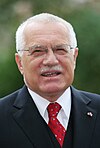Antonín Baudyš
Antonín Baudyš | |
|---|---|
 A. Baudys in 2010 | |
| Minister of Defense | |
| In office January 1993 – 22 September 1994 | |
| Prime Minister | Václav Klaus |
| Preceded by | Office established |
| Succeeded by | Vilem Holan |
| Deputy Prime Minister | |
| In office 1989 – July 1992 | |
| Personal details | |
| Born | 9 September 1946 Prague |
| Died | 24 August 2010 (aged 63) |
| Nationality | Czech |
| Political party | Czechoslovak People's Party Christian Democratic Union - Czechoslovak People's Party |
| Alma mater | Czech Technical University |
Antonín Baudyš (9 September 1946 – 24 August 2010) was a Czech academic and politician who served as defense minister from 1993 to 1994. He was the first defense minister of the Czech Republic.[1]
Early life and education
[edit]Baudyš was born in Prague on 9 September 1946.[2][3] He studied mechanical engineering[1] and graduated from the Czech Technical University (CVUT).[3]
Career
[edit]Baudyš worked as a university professor at his alma mater, CVUT, until 1989.[1][3] He became a member of the Czechoslovak People's Party (CSL) in 1970.[3] He was named deputy prime minister in 1989 shortly after the fall of communist regime and held the post until July 1992.[3] He was appointed defense minister to the coalition cabinet led by Prime Minister Václav Klaus in January 1993.[4] The ministry was formed with his appointment.[5] He was a member of the Christian Democratic Union-Czechoslovak People's Party (KDU-CSL).[6] On 22 September 1994, Vilém Holáň of KDU-CSL replaced Baudyš in the post.[7]
Following his removal from office, he worked as a businessman[8] and a popular astrologist.[3]
Activities
[edit]One of his first activities as defense minister was to initiate the cleansing of the society from hard-liner communists and informers.[1] He stated his aim as defense minister to transform the ministry into "an integrated civilian-military institution".[9] During his tenure Baudyš was informed that the Czech army had had pathogens.[10] He ordered the destruction of them due to the fact that they were no longer necessary.[10]
Personal life and death
[edit]Baudyš married twice. He had two sons from his first marriage.[3] In May 2010, he divorced his first wife and married a woman who was 23 years younger than him.[3]
He died at age 63 on 24 August 2010.[3]
References
[edit]- ^ a b c d Marybeth Peterson Ulrich (1999). Democratizing Communist Militaries: The Cases of the Czech and Russian Armed Forces (PDF). University of Michigan Press. p. 85. ISBN 978-0-472-10969-2.
- ^ Brokl, Lubomir; Zdenka Mansfeldová (December 1994). "Czech Republic". European Journal of Political Research. 26 (3–4): 269–277. doi:10.1111/j.1475-6765.1994.tb00446.x.
- ^ a b c d e f g h i "Baudys held high posts in Czechoslovak, Czech govts in 1990s". Europe Intelligence Wire. Prague. Czech News Agency. 24 August 2010.
- ^ Andrew A. Michta (1 January 1999). America's New Allies: Poland, Hungary, and the Czech Republic in NATO. University of Washington Press. p. 135. ISBN 978-0-295-80376-0.
- ^ Vesselin Dimitrov; Klaus H. Goetz; Hellmut Wollmann (2006). Governing After Communism: Institutions and Policymaking. Rowman & Littlefield. p. 131. ISBN 978-0-7425-4009-5.
- ^ Tomas Kellner (28 September 1994). "Sacked Defense Minister Opens Old Wounds". The Prague Post. Archived from the original on 26 August 2013.
- ^ Jeffrey Simon (1996). NATO Enlargement and Central Europe: A Study in Civil-military Relations. DIANE Publishing. p. 221. ISBN 978-1-4289-8158-4.
- ^ Philip Shenon (19 October 1996). "Czechs Say They Warned U.S. of Chemical Weapons in Gulf". The New York Times.
- ^ Natalie Mychajlyszyn; Harald Von Riekhoff (2004). The Evolution of Civil-military Relations in East-Central Europe and the Former Soviet Union. Greenwood Publishing Group. p. 52. ISBN 978-0-313-31562-6.
- ^ a b Mark Wheelis; Lajos Rózsa (2009). Deadly Cultures: Biological Weapons since 1945. Harvard University Press. p. 162. ISBN 978-0-674-04513-2.




